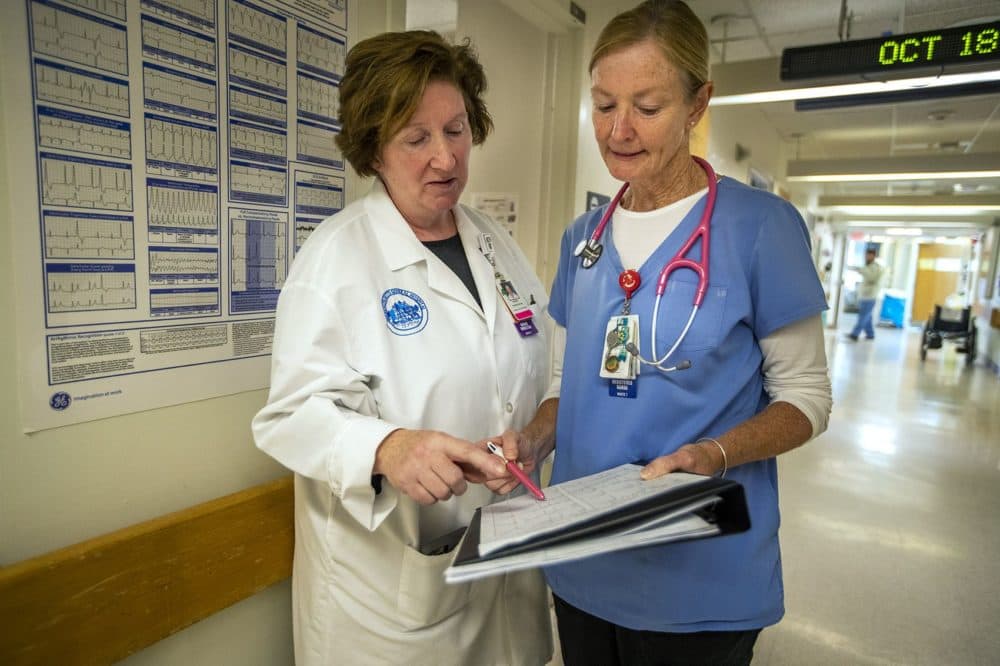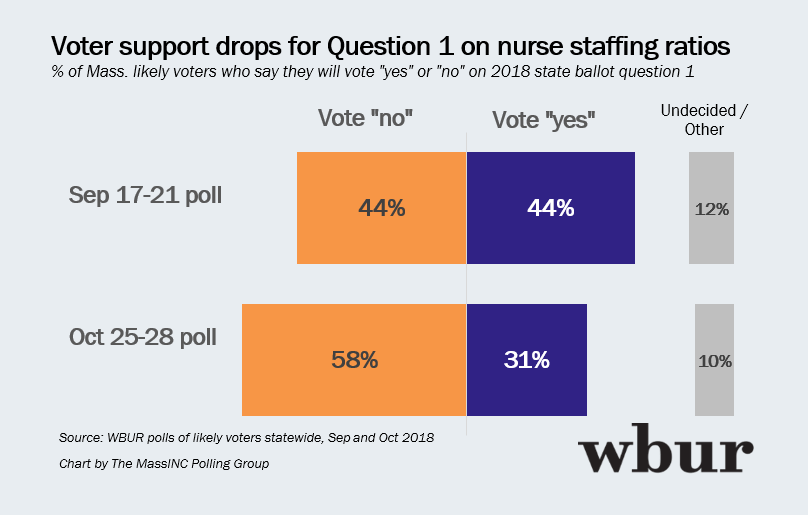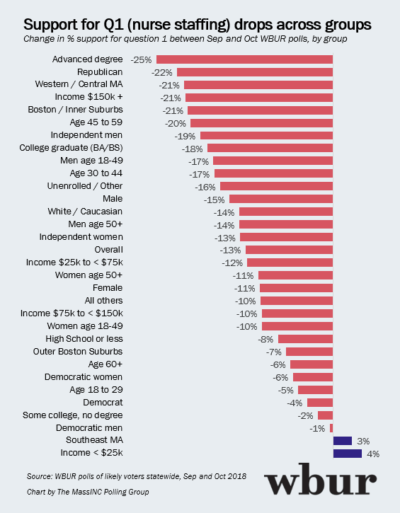Advertisement
WBUR Poll: Most Mass. Voters Now Oppose Ballot Question About Nurse Staffing
Resume
Massachusetts voters are souring on a ballot measure that would limit the numbers of patients assigned to nurses, according to a WBUR poll (topline results, crosstabs) out Wednesday that shows 58 percent of voters now plan to say "no" on Question 1.
Earlier polls showed the "yes" camp leading or tied with the "no" side.

A "yes" on Question 1 would set new nurse-to-patient ratios: one-on-one care for women in labor, for instance, and a maximum of five psychiatric patients per nurse. There would be caps for other medical situations, too.
David Bindoo, 40, of Rutland, said he initially planned to vote "yes" because he believes nurses are sometimes overworked. But he said he has changed his mind after studying the issue, and will vote "no."
"If you have to put more nurses into the hospitals to do the job that's being done now, the effects of that would be increased medical costs," he said.
Bindoo's aboutface on Question 1 appears to represent the mood of the electorate. The "no" side leads by 27 points in the new WBUR poll and by the same margin in a Boston Globe poll published earlier this week.
That's a big swing since last month, when a WBUR poll showed a dead heat, and a Globe poll had the "yes" camp in front by 19 points.
One major development is voters now have a better sense of the price tag. At the time of the earlier surveys, voters had only the wildly different estimates of the opposing sides.
The state's largest nurses' union, which favors patient quotas, has said Question 1 would cost no more than $47 million per year. Hospitals, which are against the measure, have claimed it would cost about $1 billion per a year.
Early this month, an independent watchdog called the Massachusetts Health Policy Commission said the hospitals' figure is closer to reality. The commission said hospitals would have to hire at least 2,286 additional nurses, altogether.

"Voters are looking for a reason to maintain the status quo; they need to be convinced," said Steve Koczela, president of the MassINC Polling Group, which conducted the poll for WBUR. " 'No' money and 'no' messaging tends to be a bit more effective. Voters who aren't quite sure what to make of an issue tend to look for reasons to vote against ballot questions, which is why you often see the percent 'no' really increasing, particularly in the late stage of the campaign."
Darlene Tucker, 50, of Hopkinton, has found a simple reason to say "no" on Question 1.
"I don’t believe it is somewhere where the government should be sticking their nose in and making the rules," she said.
The "no" side has worked hard to frame the issue as a matter of government interference. But the "yes" side contends the push for mandatory staffing levels comes from nurses themselves.
In a WBUR poll a couple of weeks ago, registered nurses supported Question 1 by only a few percentage points.
Still, the message that nurses are in favor resonates with Carl Buxbaum, who plans to vote "yes."
"I tend to want to side with or believe the opinion of the unions," said Buxbaum, 57, of Marblehead. "I’m cynical about the amount of money on the other side and the backing of hospitals and the profit motive."
The "no" camp, led by hospitals, has spent $17.6 million so far; the "yes" side has spent $10.4 million.
Two other questions are also on the ballot but appear less competitive. Roughly two-thirds of voters plan to say "yes" on Questions 2 and 3.
"Yes" on 2 would create a commission with the ambitious goal of finding a way to amend the U.S. Constitution to limit corporate spending on elections.
"Yes" on 3 would preserve a state law that prohibits discrimination against transgender people in places of public accommodation — notably, bathrooms.
Donna Howard is voting "yes" on that question. She said the two-year-old law has made a positive difference for her transgender son.
"For him, it makes them feel safer, as I've been told," Howard said. "They feel as though they can go and just be who they are. It made it, emotionally, much better for him to handle."
The WBUR poll has an error margin of 4.4 percentage points.
This segment aired on October 31, 2018.

